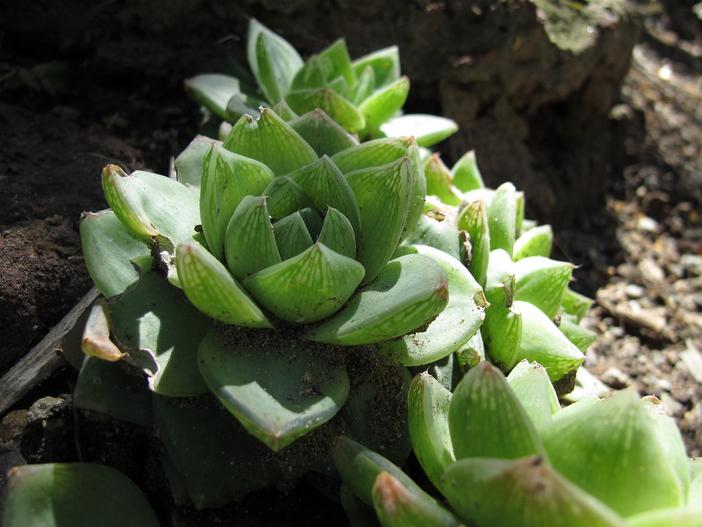Cathedral Window Haworthia
(Haworthia cymbiformis)
Cathedral Window Haworthia (Haworthia cymbiformis)
/
/

Megan Hansen
CC BY-SA 2.0
Image By:
Megan Hansen
Recorded By:
Copyright:
CC BY-SA 2.0
Copyright Notice:
Photo by: Megan Hansen | License Type: CC BY-SA 2.0 | License URL: https://creativecommons.org/licenses/by-sa/2.0/ | Uploader: MeganEHansen | Publisher: Flickr


























Estimated Native Range
Summary
Haworthia cymbiformis, commonly known as Cathedral Window Haworthia, is an evergreen succulent plant native to the Eastern Cape Province of South Africa, where it thrives on rocky outcrops and cliff faces. It is a small plant, reaching only about 0.3 feet (0.09 meters) in height and width, and forms dense clumps of rosettes. The thick, fleshy, light green leaves are boat-shaped and somewhat translucent at the tips, allowing sunlight to penetrate and illuminate the interior, resembling stained glass windows of a cathedral. This adaptation is particularly useful in its native habitat, where it often grows partially buried in sandy soils to avoid the intense sun.
Cathedral Window Haworthia is valued for its unique foliage and compact size, making it an ideal choice for container gardening, rock gardens, and as a houseplant. It blooms in spring and summer, producing small white flowers that are not particularly showy compared to its striking leaves. This plant prefers bright, indirect light or partial shade and requires well-draining soil to prevent root rot. Overwatering is a common issue, so it’s best to allow the soil to dry out between waterings. It is not known for having significant pest or disease problems, but mealybugs can occasionally be an issue.CC BY-SA 4.0
Cathedral Window Haworthia is valued for its unique foliage and compact size, making it an ideal choice for container gardening, rock gardens, and as a houseplant. It blooms in spring and summer, producing small white flowers that are not particularly showy compared to its striking leaves. This plant prefers bright, indirect light or partial shade and requires well-draining soil to prevent root rot. Overwatering is a common issue, so it’s best to allow the soil to dry out between waterings. It is not known for having significant pest or disease problems, but mealybugs can occasionally be an issue.CC BY-SA 4.0
Plant Description
- Plant Type: Succulent
- Height: 0.3-0.4 feet
- Width: 0.3-0.5 feet
- Growth Rate: Slow
- Flower Color: White
- Flowering Season: Spring, Summer
- Leaf Retention: Evergreen
Growth Requirements
- Sun: Full Sun, Part Shade
- Water: Low, Medium
- Drainage: Fast
Common Uses
Drought Tolerant, Low Maintenance, Potted Plant, Street Planting
Natural Habitat
Rocky outcrops and cliff faces in the Eastern Cape Province of South Africa
Other Names
Common Names: Näthaworthia
Scientific Names: , Haworthia cymbiformis, Aloe cymbaefolia, Aloe cymbiformis, Catevala cymbiformis,
GBIF Accepted Name: Haworthia cymbiformis (Haw.) Duval